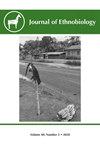“回归土地”:加拿大大草原上的土著知识和气候变化倡议
IF 2.9
3区 社会学
Q1 ANTHROPOLOGY
引用次数: 2
摘要
摘要虽然对土著居民气候变化知识的研究正在增加,特别是在北极地区,但很少有研究记录了加拿大草原省份(阿尔伯塔省、萨斯喀彻温省和马尼托巴省)土著居民对气候变化的看法。本文解决了这一差距,并采用基于土著社区的研究方法,使用半结构化访谈和参与式视频来探索草原上的土著人民如何经历和应对气候变化。对条约1、4、6、7和8土著领土上8个社区的成员进行了10次视频采访。采用视频编辑与定性内容分析相结合的方法,制作了8个短视频。结果表明,不同地区的参与者经历了环境的变化,这是由于工业发展、气候变化和殖民主义的其他影响的累积影响,这对文化福祉产生了重大影响。社区也在寻求解决方案,如以土地为基础的教育、可再生能源、基层行动主义、跨文化对话和生态恢复,这些都有助于应对这些社会生态挑战。在这些解决方案中,出现了六个共同主题:土著领导;能力和自给自足;经济可持续发展;分享本土知识;与土地相连的;在本土知识和西方科学之间架起桥梁。虽然越来越多的人认识到,倾听土著居民在气候变化问题上的声音至关重要,但本文对理解草原各省土著社区受到气候变化影响和应对气候变化的方式的多样性和相似之处,以及跨文化和地域分享这些观点的合作和创造性方法,做出了重大贡献。本文章由计算机程序翻译,如有差异,请以英文原文为准。
“A Return to and of the Land”: Indigenous Knowledge and Climate Change Initiatives across the Canadian Prairies
Abstract. While research on Indigenous knowledges on climate change is increasing, especially in the Arctic, few studies document Indigenous perspectives on climate change in the Canadian Prairie provinces (Alberta, Saskatchewan, and Manitoba). This paper addresses this gap and follows an Indigenous community-based research approach using semi-structured interviews and participatory video to explore how Indigenous peoples in the Prairies are experiencing and responding to climate change. Ten video interviews were conducted with members of eight communities across the Indigenous territories of Treaties 1, 4, 6, 7, and 8. An integrated video editing and qualitative content analysis approach was conducted and eight short videos were produced. Results show that participants across diverse territories have experienced changes in their environments—attributed to the cumulative impacts of industrial development, climate change, and other influences of colonialism—which have significant impacts on cultural well-being. Communities are also pursuing solutions—such as land-based education, renewable energy, grassroots activism, cross-cultural dialogues, and ecological restoration—which serve to address these socio-ecological challenges. Across these solutions, six common themes emerged: Indigenous leadership; capacity and self-sufficiency; sustainable economic development; sharing Indigenous knowledge; connecting with the land; and bridging Indigenous knowledge and Western science. While it is increasingly recognized as critical to heed Indigenous voices on climate change, this paper makes a significant contribution to understanding the diversity and parallels in the ways in which Indigenous communities are being impacted by and responding to climate change in the Prairie provinces, as well as collaborative and creative methods for sharing these perspectives across cultures and geographies.
求助全文
通过发布文献求助,成功后即可免费获取论文全文。
去求助
来源期刊

Journal of Ethnobiology
Social Sciences-Anthropology
CiteScore
4.80
自引率
3.40%
发文量
21
审稿时长
>12 weeks
期刊介绍:
JoE’s readership is as wide and diverse as ethnobiology itself, with readers spanning from both the natural and social sciences. Not surprisingly, a glance at the papers published in the Journal reveals the depth and breadth of topics, extending from studies in archaeology and the origins of agriculture, to folk classification systems, to food composition, plants, birds, mammals, fungi and everything in between.
Research areas published in JoE include but are not limited to neo- and paleo-ethnobiology, zooarchaeology, ethnobotany, ethnozoology, ethnopharmacology, ethnoecology, linguistic ethnobiology, human paleoecology, and many other related fields of study within anthropology and biology, such as taxonomy, conservation biology, ethnography, political ecology, and cognitive and cultural anthropology.
JoE does not limit itself to a single perspective, approach or discipline, but seeks to represent the full spectrum and wide diversity of the field of ethnobiology, including cognitive, symbolic, linguistic, ecological, and economic aspects of human interactions with our living world. Articles that significantly advance ethnobiological theory and/or methodology are particularly welcome, as well as studies bridging across disciplines and knowledge systems. JoE does not publish uncontextualized data such as species lists; appropriate submissions must elaborate on the ethnobiological context of findings.
 求助内容:
求助内容: 应助结果提醒方式:
应助结果提醒方式:


